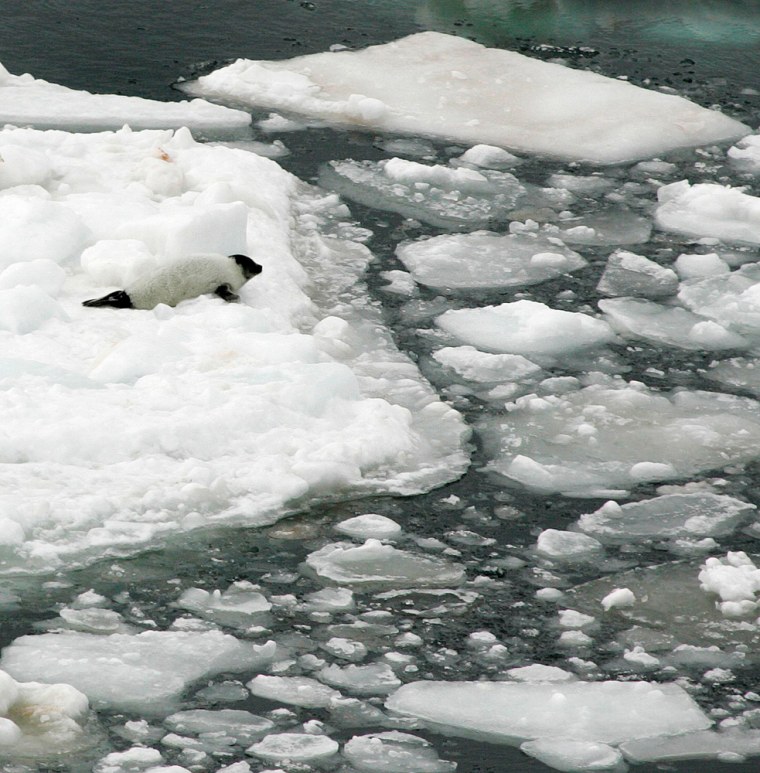Canada announced Thursday that hunters can kill 270,000 harp seals this spring, despite environmentalists' protests that thousands of pups too young to swim have fallen through ice thinned by global warming, jeopardizing the stability of the population.
Animal-rights groups worldwide condemned the hunt as inhumane.
The traditional spring hunt is key to the livelihood of Canadian seal hunters and aboriginal peoples. To protect the seal population in Canada — which now stands at about 5.5 million — fisheries officials announced a sharp reduction in the number that can be killed, down from last year's quota of 335,000 animals.
"These decisions are guided by principles of conservation," Minister of Fisheries and Oceans Loyola Hearn said in a statement. "I also want to ensure that the people who depend on this resource for their livelihood will benefit from it over the long-term."
Hearn acknowledged the thin ice in the Gulf of St. Lawrence, where animal rights groups have complained that pups unable to swim are dying by the thousands. He said only 20 percent of the hunt takes place in the Gulf and that ice conditions in the Northern Gulf and off the coast of Newfoundland and Labrador remain good.
There was no announcement of the opening date of the hunt, which has been getting later each year due to the thinning ice and a lack of pups. The hunt opened on March 26 last year.
Activists respond
The International Fund for Animal Welfare and the Humane Society of the United States, both of which have long led international campaigns to end the centuries-old hunt, immediately condemned the new hunting quota.
"With harp seals facing a growing threat from global warming and poor ice conditions, continuing the hunt at the unsustainable level announced today is nothing short of irresponsible," IFAW senior researcher Sheryl Fink said in a statement. "This decision has no basis in science or conservation."
Research indicates that killing more than 165,000 harp seals would make the population decline, the group said. Federal fisheries officials counter that the overall seal population has tripled since the 1970s. Environmentalists say it is shrinking in the southern part of the Gulf, which bodes ill for the region overall.
Rebecca Aldworth of the Humane Society, who is in Newfoundland preparing to observe the hunt when it begins, said flyovers of the region indicate that thousands of seal pups have drowned because of the poor ice, which conservationists blame on global warming.
"The entire seal population has been essentially swept out into the Atlantic," she said in a telephone interview. "The ice has melted; it's literally just slush out there. We looked for those hundreds of thousands of pups and we found just three surviving."
Aldworth has been observing the hunt for nine years and has repeatedly clashed with fisheries officials and was banned from observation last year after allegedly interfering with the hunt.
Fisheries officials said Thursday they would issue observation permits this year, but only if they felt it was safe for helicopters to land on the ice.
Aldworth says she has witnessed seals being skinned alive and other "unimaginable cruelty."
The United States has banned Canadian seal products since 1972 and the European Union banned the white pelts of baby seals in 1983.
The European Commission said earlier this month that it would launch a study to see whether seal hunting in Canada is carried out humanely, though it has so far rejected calls for an EU-wide ban on the import of adult seal pelts and other products.
